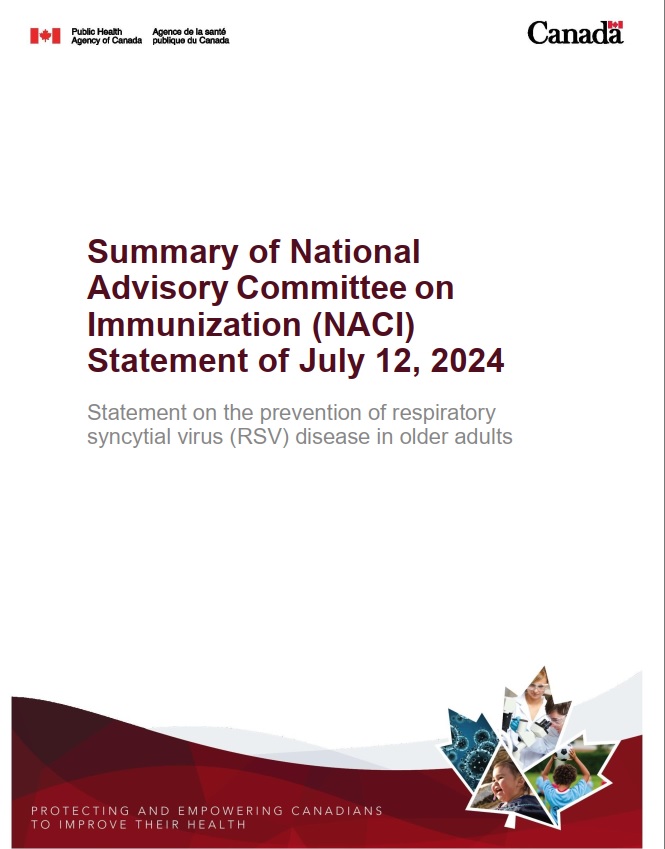Summary of NACI statement of July 12, 2024: Statement on the prevention of respiratory syncytial virus disease in older adults
Download in PDF format
(304 KB, 4 pages)
Organization: Public Health Agency of Canada
Date published: 2024-07-12
Cat.: HP40-364/2-2024E-PDF
ISBN: 978-0-660-71993-1
Pub.: 240205
On this page
Overview
- On July 12, 2024, the Public Health Agency of Canada (PHAC) released the National Advisory Committee on Immunization’s (NACI) Statement on the prevention of respiratory syncytial virus (RSV) disease in older adults. This guidance is based on current evidence and NACI expert opinion.
- Health Canada has authorized two new vaccines to protects older adults from RSV:
- RSVPreF3 (AREXVY, GSK) was authorized on August 4, 2023, to protect adults 60 years of age and older.
- RSVpreF (ABRYSVOTM, Pfizer) was authorized on December 21, 2023, to protect adults 60 years of age and older. This formulation is also authorized for pregnant women and pregnant people who are 32 to 36 weeks pregnant to protect infants from RSV.
Following a thorough review of the evidence of RSVPreF3 and RSVpreF in adults over 60 years of age, NACI makes the following recommendations for public health decisions:
- NACI recommends RSV immunization programs for adults 75 years of age and older, particularly for those who are at increased risk of severe RSV disease. (Strong recommendation)
- One dose of either RSVpreF or RSVPreF3 can be used.
- NACI recommends RSV immunization programs for adults 60 years of age and older who are residents of nursing homes and other chronic care facilities. (Strong recommendation)
And for health care providers advising individual clients:
- NACI recommends that an RSV vaccine may be considered as an individual decision by adults 60 to 74 years of age in consultation with their health care provider. (Discretionary recommendation)
Clinically significant chronic health conditions
Clinically significant chronic health conditions for which RSV vaccination is particularly important:
- Cardiac or pulmonary disorders (includes chronic obstructive pulmonary disease, asthma, cystic fibrosis and conditions affecting ability to clear airway secretions)
- Diabetes mellitus and other metabolic diseases
- Moderate and severe immunodeficiency (refer to the list of immunocompromising conditions developed for COVID-19)
- Chronic renal disease
- Chronic liver disease
- Neurologic or neurodevelopmental conditions (includes neuromuscular, neurovascular, neurodegenerative [e.g., dementia], neurodevelopmental conditions, and seizure disorders, but excludes migraines and psychiatric conditions without neurological conditions)
- Class 3 obesity (defined as body mass index of 40 kg/m2 and over)
What you need to know
- Respiratory syncytial virus (RSV) is a common respiratory virus that accounts for a significant burden of disease in older adults. RSV disease can have serious complications for older adults, including hospitalization, intensive care unit admission, and death.
- While infants are at the highest risk of severe RSV disease, among adults, the risk of severe RSV disease increases with age and with certain medical conditions.
- The vaccines RSVPreF3 (AREXVY, GSK) and RSVpreF (ABRYSVOTM, Pfizer) work best when given just before or during the RSV season. People at highest risk of severe RSV disease should time their vaccination to optimize protection during the RSV season. Prior to the COVID-19 pandemic, the RSV season in most of Canada was typically November to April.
- Available evidence demonstrates that RSV vaccines work well with a single dose to prevent RSV disease in adults for one year, or potentially longer, and have a good safety profile.
- It is not clear yet if these vaccines will protect for more than one year, or if the responses for these vaccines can be boosted with another dose later. Adults 75 years of age and older, particularly those who have a chronic health condition that puts them at increased risk, are expected to benefit the most from vaccination during the RSV season. Adults less than 75 years of age who do not live in a congregate setting can discuss with a health care provider whether RSV vaccination may be appropriate for them at this time.
- Early safety data from surveillance systems in the United States suggest there may be an increased rate of Guillain-Barré syndrome after RSV vaccination in adults 60 years of age and older. However, the available early data cannot confirm an association at this time. This issue will continue to be monitored closely.
- Giving the RSV vaccine with other adult vaccines is acceptable and supported. If possible, RSV vaccine should be given at least six weeks before or after non-seasonal vaccines to avoid inadvertently attributing an adverse event from another vaccine to the RSV vaccine.
- Provinces and territories determine their vaccination programs and policies, including those for RSV, based on their unique circumstances, including local epidemiology. Individuals are encouraged to consult a trusted health care provider to see which options are available for you this fall.
NACI will continue to monitor the evolving evidence and will update guidance as needed and as new products or indications for RSV vaccines are authorized by Health Canada.
For more information on NACI's recommendations on the use of RSV vaccines in older adults, please refer to the RSV vaccine chapter in the Canadian Immunization Guide (CIG), as well as additional statements on the NACI web page.
